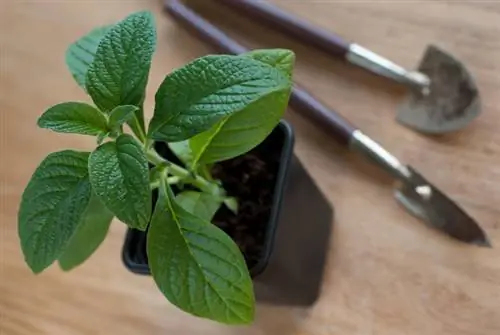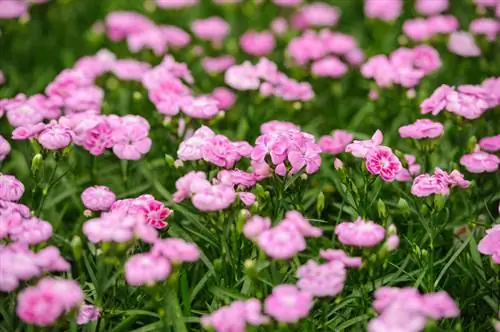- Author admin leonars@hobbygardeners.com.
- Public 2023-12-16 16:46.
- Last modified 2025-01-23 11:20.
Whether yellow, orange, pink, rose-red or two-tone - the garden lilies provide an exotic flair in perennial beds, along the path and in open spaces. But how high is your care requirement? Do they need to be looked after and cared for front and back?

How do you properly care for garden lilies?
Garden lilies need regular watering to avoid drought, fertilizer when flower buds form, careful pruning in summer and autumn, propagation by division and possibly frost protection in winter. The following applies: less is more.
Is watering the plants necessary?
Garden lilies hate drought. Therefore, you should always make sure that the soil does not dry out. It should stay moist. In order not to have to go into the garden every day to water, it is advisable to mulch the soil and plant the garden lilies with ground cover plants. This means moisture stays in the soil longer.
When should garden lilies be fertilized?
When the first flower buds appear, fertilizer is recommended. Organic material such as horn shavings (€32.00 on Amazon) or compost should be used as fertilizer. It is enough to fertilize the garden lilies once.
When and how should garden lilies be trimmed?
This should be taken into account when cutting garden lilies:
- handling sharp, clean secateurs
- cut off wilted flowers regularly in summer (stimulate new growth)
- cut close to the ground in autumn when the plant has wilted
- Autumn pruning serves as preparation for wintering
How can garden lilies be propagated?
There are two methods of propagation: division and sowing. While sowing is unusual because it is more difficult and time-consuming, division is common. Sowing is done in spring and division after flowering in late summer.
The onion peels are carefully separated from each other. They are planted together with a bud (also visible at the base of the bulbs). A temperature of 20 °C is ideal for germination and growth.
Should garden lilies be overwintered?
If you live in a harsh location and have planted your garden lilies there, overwintering makes sense. The root area is provided with a layer of humus. In addition, fir branches, brushwood or straw are placed over it to protect against frost.
Which diseases and pests can be dangerous?
Garden lilies are affected by stem rot in poor location conditions. This is a fungal pathogen that occurs due to waterlogging in the root area and can kill the garden lily. Otherwise, a pest called lily chicken sometimes appears. You can recognize this beetle by its red color.
Tips & Tricks
When it comes to caring for garden lilies, the following applies: less is more. They should not be fertilized too much and watered too heavily.






